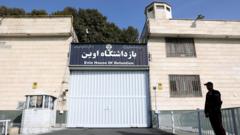Israeli military operations have targeted Evin prison, home to numerous political detainees, and access routes to the controversial Fordo uranium enrichment facility in Iran. This military action has resulted in casualties and widespread condemnation, raising severe human rights and geopolitical concerns.
Israeli Airstrikes Target Evin Prison and Fordo: A Drastic Escalation

Israeli Airstrikes Target Evin Prison and Fordo: A Drastic Escalation
The latest Israeli strikes on Tehran's Evin prison and access routes to the Fordo nuclear site mark a significant escalation in regional tensions, prompting international condemnation.
Israel has escalated its military operations in Iran, recently targeting Tehran's Evin prison—infamous for housing political prisoners—and damaging parts of the complex, according to Iran's judiciary. State-run outlets report that the situation has been stabilized post-attack, which Iran asserts violates international norms. Footage broadcast on state television depicted rescue workers attending to casualties and searching through rubble. Israeli Defense Minister emphasized that the operation aimed at "regime targets" and facilities tied to governmental oppression.
The recent military activity included airstrikes on access routes to Iran's Fordo uranium enrichment plant, coinciding with U.S. strikes employing "bunker-busting" munitions aimed at the same facility. Iranian-led missile attacks ensued, targeting multiple locations in Israel with estimates of 24 casualties. The conflict marks intensifying hostilities that began with Israel's recent campaign against what they characterize as existential threats posed by Iran’s weapon programs.
Evin prison, a site known for its detainment of dissidents and foreign nationals, experienced significant destruction from the strikes, leading to fears for the safety of inmates and visitors. Reports mentioned the chaos that ensued among inmates at the facility while investigators noted damage to areas typically congregated by relatives and legal representatives. Amnesty International condemned the airstrike, citing it as a potential war crime under international humanitarian law.
In defiance of Israel's military claims, Iran's foreign minister condemned the strikes as reckless, especially given the risk to foreign nationals imprisoned there, while also publicizing that their nuclear ambitions remain peaceful. The escalating cycle of military responses reflects a volatile region grappling with implications of military actions on human rights and geopolitical stability.
As tensions further unfold, international watchdogs call for urgent dialogue and oversight, particularly concerning Iran's nuclear activities and the safety of prisoners caught in this conflict, which continues to prolong a fraught political landscape.





















